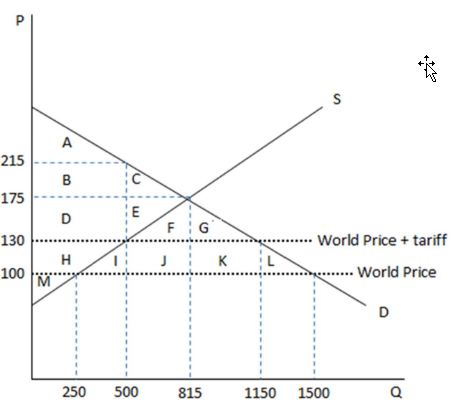Which of the following statements about demand and price elasticity of demand is? TRUE?
A. Since the demand curve has a negative? slope, the price elasticity of demand is negative.
B. Since the demand curve has a negative? slope, the price elasticity of demand is positive.
C. Since the demand curve has a positive? slope, the price elasticity of demand is negative.
D. Since the demand curve has a positive? slope, the price elasticity of demand is positive.
Answer: A. Since the demand curve has a negative? slope, the price elasticity of demand is negative.
You might also like to view...
If, while you are holding a coupon bond, the interest rates on other similar bonds fall, you can be sure that
A) the coupon payments on your bond will fall. B) the market price of your bond will rise. C) the market price of your bond will fall. D) the par value of your bond will rise.
According to the graph shown, if the economy is operating under free trade, who would be opposed to a tariff?
This graph demonstrates the domestic demand and supply for a good, as well as a tariff and the world price for that good.

A. Foreign producers
B. Domestic consumers
C. Domestic producers
D. Both A and B would be opposed to a tariff.
Which of the following would be recorded as a U.S. merchandise export? a. An American tourist spends 10,000 francs on vacation in the south of France. b. A machine shop in Ohio purchases a grinder made in Italy. c. An American receives a $50 dividend check on stock she owns in a business in Germany
d. The U.S. government subsidizes American farmers for planting corn for export. e. France purchases a new jet fighter aircraft from the Boeing Company in the United States.
Innovation lagged in the centrally planned economies because:
A. there was too much domestic business competition. B. there was too much competition from foreign firms. C. enterprises resisted innovation in fear that their production targets would be raised. D. exports had to equal imports for the plan to work.